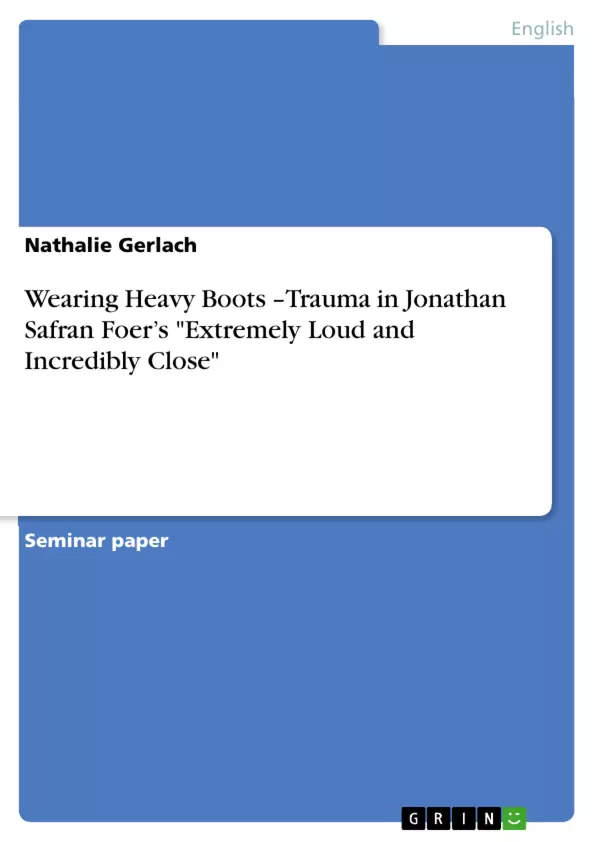I didn’t understand why I needed help, because it seemed to me that you should wear heavy boots when your dad dies, and if you aren’t wearing heavy boots, then you need help.
(Foer 200, emphasis original)
On an early Tuesday morning in September 2001 two as human bombs converted airplanes hit the World Trade Center, killed about 2870 people and left nearly 10.000 children with only one or even no parent at all (Anzieu-Premmereur 281). This drastic disaster ended America as it was known before 9/11 and overwhelmed its inhabitants with tragedy, terror and fear, leaving behind an overpowering numbness that will express itself through flags flying at half-mast, millions of shattered individuals, repetitive pictures of horror in the media and attempts to handle the unbearable through literature.
In Foer’s Extremely Loud and Incredibly Close (for shortening reasons from now on referred to as EL&IC) the nine-year-old protagonist Oskar Schell suffers from the loss of his dear father Thomas Schell Jr. who died on 11 September in the restaurant Windows of the World located in the north tower of the World Trade Center.
This paper will show how Foer’s three main characters in EL&IC are portrayed as survivors of trauma, what experiences and guilt they suffer from and how they deal with these on the level of language, action and image. Referring to trauma theory this text will prove that each of the three characters has a different way of coping with the traumatic experiences they faced (in the case of the grandparents even two experiences are taken into consideration) and to what extend a resolution of trauma is achieved by them. The unconventional style of narration and design of EL&IC, its inclusion of blankness and blackness and its constant use of pictures through Thomas Sr.’s daybooks as well as Oskar’s Stuff that Happened to Me, create a collage-like character of the novel that resembles the structure of trauma which will also be discussed in this paper.
Inhaltsverzeichnis (Table of Contents)
- Wearing Heavy Boots - Trauma in Jonathan Safran Foer's Extremely Loud and Incredibly Close
- List of Works Cited
Zielsetzung und Themenschwerpunkte (Objectives and Key Themes)
This paper examines the portrayal of trauma in Jonathan Safran Foer's Extremely Loud and Incredibly Close (EL&IC) through the lens of trauma theory. It aims to demonstrate how the three main characters - Oskar Schell, his grandfather, and his grandmother - grapple with the aftermath of traumatic experiences, highlighting their different coping mechanisms and their struggle to integrate the traumatic events into their lives. The paper explores the impact of trauma on language, action, and imagery within the narrative, analyzing the characters' emotional states, their responses to loss and absence, and the role of memory and mourning in their recovery.
- Trauma and its impact on individual experience
- Coping mechanisms and their influence on the characters' actions and behavior
- The role of memory and mourning in the process of healing from trauma
- The representation of trauma through language, action, and imagery in EL&IC
- The unconventional style of narration and design in the novel as a reflection of the fragmented nature of trauma
Zusammenfassung der Kapitel (Chapter Summaries)
The novel opens with Oskar Schell, a nine-year-old boy navigating the aftermath of his father's death in the September 11th attacks. He discovers a mysterious key in his father's closet and embarks on a quest to find its matching lock, believing this will somehow bring him closer to his deceased father. Oskar's story is interspersed with chapters narrated by his paternal grandparents, both of whom experienced the traumatic Dresden bombing in 1945 and immigrated to the United States, leaving behind their past and families. The novel's structure, with its alternating narratives, reflects the fragmented nature of trauma and the characters' attempts to piece together their experiences and find meaning amidst the chaos.
Schlüsselwörter (Keywords)
The paper focuses on the themes of trauma, loss, absence, memory, mourning, and coping mechanisms. It examines the use of language, action, and imagery in portraying the characters' emotional states and their struggles to integrate traumatic events into their lives. The study utilizes trauma theory and Freudian concepts like melancholy and mourning to analyze the characters' individual experiences and their responses to loss. The paper also explores the unconventional style of narration and design in EL&IC as a reflection of the fragmented nature of trauma.
- Citar trabajo
- Nathalie Gerlach (Autor), 2011, Wearing Heavy Boots –Trauma in Jonathan Safran Foer’s "Extremely Loud and Incredibly Close", Múnich, GRIN Verlag, https://www.grin.com/document/176877



